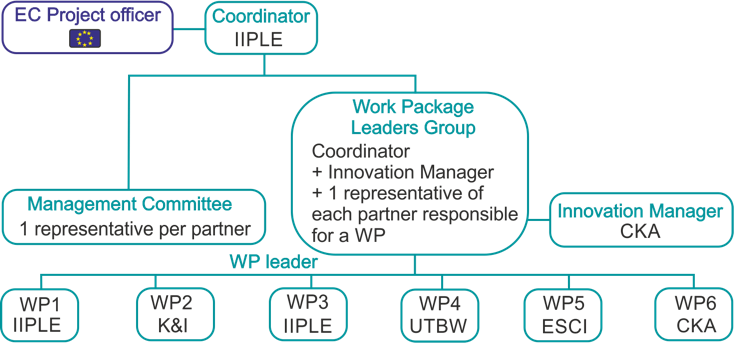The Project
INNOVating the uptake of Energy Auditing Schemes for SMEs
The project intends to address the issues regarding the low uptake of energy auditing practices by european Small and Medium sized Enterprizes (SMEs).
Euopean SMEs (definition) are exempt of the obligation to carry out energy audits, nevertheless energy transition is a joint task. Innoveas enhances the willingness to invest in energy efficiency improvements in industrial processes.
->Delivery of a fully-structured training and capacity building programme aiming at improving the use of energy audit as tools to identify the best energy saving measures to be adopted in SMEs.
-The large audience will be reached through webinars
-SMEs will be reached trough tailored in-company-trainings according to their needs and specificities
Project Organisation
The Innoveas governance structure is composed of the project coordinator, the management committee, the Work Package Leaders Group, the innovation manager and the WP leader.
In practical terms, a series of work packages have been devised to make innoveas a reality. These are organised around the three key areas of action: analysis of behavioural barriors, building capacities and creating trainings, creation of a pan-European network.
WP 1 - Project Management
WP leader : IIPLE
WP manager : Luisa Sileni, Riccardo Cariani
WP 1 has the following main objectives:
To provide an efficient project administration and maintain a continuous communication between the consortium and the Commission
To ensure a smooth project running regarding the financial and legal management
To achieve timely submission of progress and financial reports to the Commission
To ensure that the Description of Work and the Consortium Agreement is maintained and updated where necessary.
WP 2 - State of the art, needs and barrier assessment
WP leader : K&I
WP manager : Gabriele Quinti
WP 2 aims to carry out an analysis of the current state of the art of energy culture in SMEs in the participating countries. WP2 will specifically analyse:
- The current attitude towards energy efficiency and the perception of energy audits as an instrument to abate costs
The existing regulatory and financial conditions that influence the use of energy audits and the uptake of energy saving measures
The existing regulatory and financial conditions that influence the use of energy audits and the uptake of energy saving measures
WP 3 - Capacity building programme formulation
WP leader : IIPLE
WP manager : Sergio Bottiglioni
WP 3 deals with the first formulation of the capacity building packages to be proposed to users. The capacity building programme will be declined into two different actions:
The development of a training programme targeting SMEs and carried out by industrial associations and intermediaries
The development of a capacity building programme targeting other key stakeholders: policy-makers, financial institutions and auditors
WP 4 - Capacity building implementation
WP leader : UTBW
WP manager : Jürgen Meyer
WP 4 will implement training modules through a hybrid methodology consisting of class work and remote lectures with the pre-defined beneficiaries. Special attention will be paid to elaborating the metrics of students’ feedback so as to allow adjustments for the future editions. Elaboration of feedback will be segmented also by typology of participant, considering the views of:
Production and manufacturing companies
Employees of companies
Industrial associations
Energy auditors
Other stakeholders
WP 5 - Reaching and engaging stakeholders
WP leader : ESCI
WP manager : Sabine Alexandre-Klein
WP 5 aims to attract beneficiaries of the training out of the participants’ circle, it also intends to provide input in terms of needs, conditions and barriers for the evolution of demand in the future. To do so, the outreach and engagement activities will target: local industrial associations, national or European sectorial associations and ESCOs.
Activities foreseen by WP 5 include:
- Managing an extendable and growing list of stakeholders
Elaborating key messages to reach out to the stakeholders and obtain their engagement
- Interactive sessions with the stakeholders in the forms of workshops and focus groups
WP 6 - Exploitation and sustainability
WP leader : CKA
WP manager : Patrick Crehan
WP 6 will create clear operational and financial scenarios for the full commercial deployment of the project training package after the end of the project.
This will include:
Clear arrangements on the ownership of the training scheme (contents, format, delivery methods, trainers, etc.)
An exploitation strategy suggesting which form this will take and whether a new independent entity should be created, such as for instance a European Alliance for Industrial Training on Energy Efficiency
A business plan, elaborated on the basis of that strategy and defining commitments from partners, the resources, and the expected income
European Financing
Innoveas is an active supporter of energy efficiency and contributor to energy transistion. The consortium has received funding from the European Union’s Horizon 2020 research and innovation program under grant agreement No. 847095 as part of the call „LC-SC3-EE-8-2018-2019 – Capacity building programmes to support implementation of energy audits“.
It is financed by this framework from 1 June 2019 – 31 May 2022 (3 years) and coordinated by IIPLE. EU Grant: € 1.999.875 of total budget of € 1.999.875.
A complete outline of project conditions is hosted on the Cordis Website

Energy audits for SMEs
